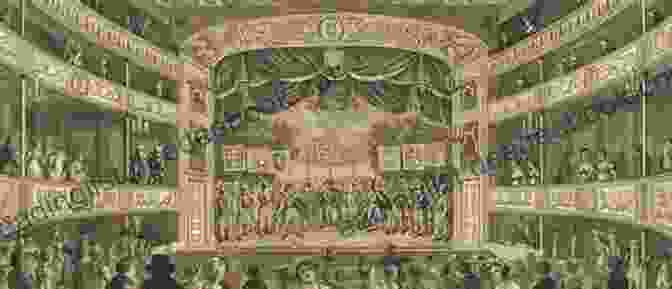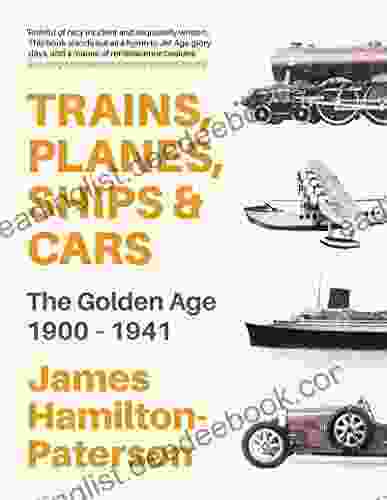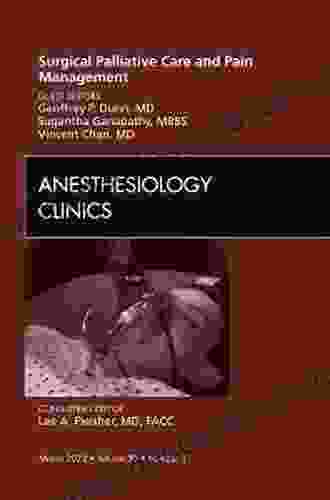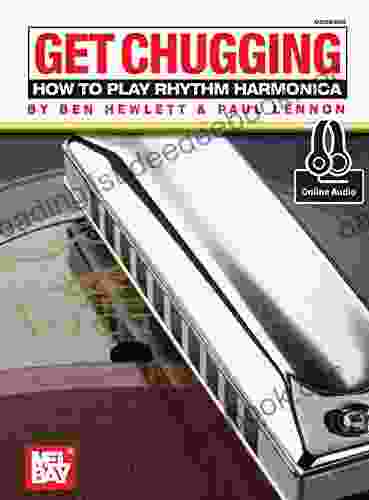Music Theater and Modern Life in the Late 19th Century: Currents in Latin America


The late 19th century was a time of great change and upheaval in Latin America. The region was grappling with the legacy of colonialism, the rise of nationalism, and the impact of industrialization. These changes were reflected in the arts, including music theater.
4.6 out of 5
| Language | : | English |
| File size | : | 39396 KB |
| Text-to-Speech | : | Enabled |
| Enhanced typesetting | : | Enabled |
| Print length | : | 336 pages |
| Lending | : | Enabled |
| Screen Reader | : | Supported |
Music theater in Latin America in the late 19th century was a vibrant and diverse art form. It drew on a variety of influences, including European opera, zarzuela (a Spanish musical theater genre),and indigenous folk music. Music theater was used to address a wide range of social and political issues, and it played an important role in shaping the cultural identity of Latin America.
The Influence of European Opera
European opera had a profound influence on music theater in Latin America. The first opera houses in the region were built in the 18th century, and by the late 19th century, opera was a popular form of entertainment in major cities.
The most popular operas in Latin America were those by Italian composers such as Verdi and Puccini. These operas were often performed in Spanish translation, and they appealed to audiences with their elaborate sets, costumes, and music.
The influence of European opera can be seen in the music of many Latin American composers. For example, the Mexican composer Melesio Morales wrote several operas that were heavily influenced by Verdi. The Brazilian composer Antônio Carlos Gomes wrote operas that were both influenced by European opera and Brazilian folk music.
The Rise of Zarzuela
Zarzuela is a Spanish musical theater genre that originated in the 17th century. It is typically characterized by its use of spoken dialogue, singing, and dancing. Zarzuela was introduced to Latin America in the 18th century, and it quickly became a popular form of entertainment.
The most popular zarzuelas in Latin America were those by Spanish composers such as Francisco Asenjo Barbieri and Ruperto Chapí. These zarzuelas were often performed in Spanish translation, and they appealed to audiences with their humor, wit, and catchy music.
The influence of zarzuela can be seen in the music of many Latin American composers. For example, the Cuban composer Ernesto Lecuona wrote several zarzuelas that were both influenced by Spanish zarzuela and Cuban folk music. The Mexican composer Juventino Rosas wrote several zarzuelas that were both influenced by Spanish zarzuela and Mexican folk music.
The Impact of Indigenous Folk Music
Indigenous folk music played an important role in the development of music theater in Latin America. Many Latin American composers incorporated indigenous folk melodies and rhythms into their music. This was especially true in the case of nationalistic composers who wanted to create a unique and authentic Latin American sound.
For example, the Mexican composer Manuel M. Ponce wrote several operas that were based on indigenous folk music. The Brazilian composer Heitor Villa-Lobos wrote several operas that were based on indigenous folk music and Afro-Brazilian rhythms.
The influence of indigenous folk music can also be seen in the music of many popular Latin American musicians. For example, the Cuban singer-songwriter Silvio Rodríguez often incorporates indigenous folk melodies into his songs. The Mexican singer-songwriter Lila Downs often incorporates indigenous folk melodies and rhythms into her songs.
Music Theater and Social Change
Music theater in Latin America was often used to address social and political issues. This was especially true in the late 19th century, when the region was grappling with the legacy of colonialism and the rise of nationalism.
Many Latin American composers used music theater to criticize the social and political injustices of their time. For example, the Mexican composer José Pablo Moncayo wrote several operas that dealt with themes of social inequality and injustice. The Brazilian composer Francisco Mignone wrote several operas that dealt with themes of national identity and independence.
Music theater also played an important role in the development of a sense of Latin American identity. Many Latin American composers used music theater to celebrate the unique culture and history of the region. For example, the Argentine composer Carlos Guastavino wrote several operas that celebrated the traditions of gaucho culture. The Peruvian composer Daniel Alomía Robles wrote several operas that celebrated the history and culture of the Inca Empire.
Music theater in Latin America in the late 19th century was a vibrant and diverse art form. It drew on a variety of influences, including European opera, zarzuela, and indigenous folk music. Music theater was used to address a wide range of social and political issues, and it played an important role in shaping the cultural identity of Latin America.
4.6 out of 5
| Language | : | English |
| File size | : | 39396 KB |
| Text-to-Speech | : | Enabled |
| Enhanced typesetting | : | Enabled |
| Print length | : | 336 pages |
| Lending | : | Enabled |
| Screen Reader | : | Supported |
Do you want to contribute by writing guest posts on this blog?
Please contact us and send us a resume of previous articles that you have written.
 Book
Book Novel
Novel Page
Page Chapter
Chapter Genre
Genre Paperback
Paperback Magazine
Magazine Newspaper
Newspaper Paragraph
Paragraph Sentence
Sentence Bibliography
Bibliography Preface
Preface Synopsis
Synopsis Footnote
Footnote Scroll
Scroll Codex
Codex Library card
Library card Biography
Biography Reference
Reference Encyclopedia
Encyclopedia Dictionary
Dictionary Librarian
Librarian Catalog
Catalog Borrowing
Borrowing Stacks
Stacks Archives
Archives Study
Study Scholarly
Scholarly Rare Books
Rare Books Special Collections
Special Collections Interlibrary
Interlibrary Literacy
Literacy Study Group
Study Group Thesis
Thesis Dissertation
Dissertation Storytelling
Storytelling Awards
Awards Reading List
Reading List Theory
Theory Textbooks
Textbooks Jeffery H Haskell
Jeffery H Haskell William C Hammett
William C Hammett Jamie Cloud Eakin
Jamie Cloud Eakin Janice Erlbaum
Janice Erlbaum Sarah Moore Fitzgerald
Sarah Moore Fitzgerald Delphine De Vigan
Delphine De Vigan Mark Abel
Mark Abel Chris Crutcher
Chris Crutcher Duane S Crowther
Duane S Crowther Chris Ferrie
Chris Ferrie Kathy Douglass
Kathy Douglass Cassandra Ellis
Cassandra Ellis Mary Owens
Mary Owens Dr John Stone
Dr John Stone Jake Lynch
Jake Lynch Kent Haruf
Kent Haruf Alfred Snider
Alfred Snider Heather Milnes
Heather Milnes William Ae Ford
William Ae Ford Kaira Rouda
Kaira Rouda
Light bulbAdvertise smarter! Our strategic ad space ensures maximum exposure. Reserve your spot today!

 Dylan MitchellThe Lifesaving Adventure of Sam Deal: Shipwreck Rescuer, History's Kid Hero
Dylan MitchellThe Lifesaving Adventure of Sam Deal: Shipwreck Rescuer, History's Kid Hero Louis HayesFollow ·16.8k
Louis HayesFollow ·16.8k Jack ButlerFollow ·3.1k
Jack ButlerFollow ·3.1k Clarence MitchellFollow ·4.3k
Clarence MitchellFollow ·4.3k Dave SimmonsFollow ·5.6k
Dave SimmonsFollow ·5.6k David BaldacciFollow ·9k
David BaldacciFollow ·9k Joseph HellerFollow ·13.5k
Joseph HellerFollow ·13.5k William PowellFollow ·17.9k
William PowellFollow ·17.9k August HayesFollow ·3.4k
August HayesFollow ·3.4k

 Diego Blair
Diego BlairUnveiling Hidden Crete: A Comprehensive Review of Richard...
In the tapestry of travel literature,...

 Earl Williams
Earl WilliamsNew Addition Subtraction Games Flashcards For Ages Year
Looking for a fun...

 Julio Ramón Ribeyro
Julio Ramón RibeyroUnveiling the Nexus of Educational Politics and Social...
Education, a fundamental pillar of society,...

 Jordan Blair
Jordan BlairTrains, Planes, Ships, and Cars: The Evolution of...
Transportation...

 Derek Bell
Derek BellFalling for Rachel Stanislaki: An Unforgettable Literary...
Step into the...

 Harry Cook
Harry CookAn Introduction to Cardiac Surgery for Anesthesia...
Cardiac surgery is a specialized...
4.6 out of 5
| Language | : | English |
| File size | : | 39396 KB |
| Text-to-Speech | : | Enabled |
| Enhanced typesetting | : | Enabled |
| Print length | : | 336 pages |
| Lending | : | Enabled |
| Screen Reader | : | Supported |










